Debbie Young's Blog, page 42
May 16, 2016
Expecting the Unexpected
A post about chance encounters on our most recent holiday in our camper van
(Originally written for the May 2016 edition of the
Tetbury Advertiser
)
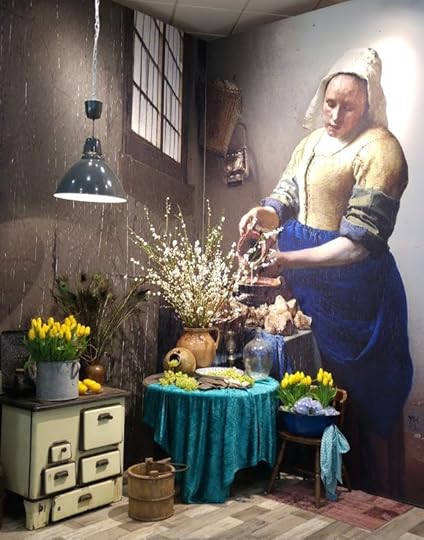 We knew the Dutch had mastered tulips, but the displays at Keukenhof Flower Gardens near Leiden took our breath away, both figuratively and literally (that’ll be my hay fever kicking in)
We knew the Dutch had mastered tulips, but the displays at Keukenhof Flower Gardens near Leiden took our breath away, both figuratively and literally (that’ll be my hay fever kicking in)As always, the highlights of our Easter holiday are the things we do not plan. The chances of being surprised on our travels are always high, because we are notoriously bad at planning our itinerary before we set off. We once embarked on a month-long tour of France with neither a country map nor a guidebook.
Serendipitous pleasures along the way may be as simple as arriving in a town to find it’s market day. Once, in Montreuil, having parked for the night in its deserted market square, we awoke next day to find the market in full swing around us. The stallholders had kindly allowed us to sleep in.
This Easter, when we toured northern Europe, we were enamoured of the witchcraft museum in the small Dutch town of Oudewater. The proprietors weigh visitors on historic market scales to test whether they are witches. Medieval folk believed that witches were very light, so that they could fly on broomsticks. Traditional punishments for the guilty included being burnt at the stake, but if you carried an Oudewater certificate stating your innocence, no-one could burn you alive. Well, you never know when that might come in handy, we thought – it’s definitely worth paying the extra Euro for one of those.
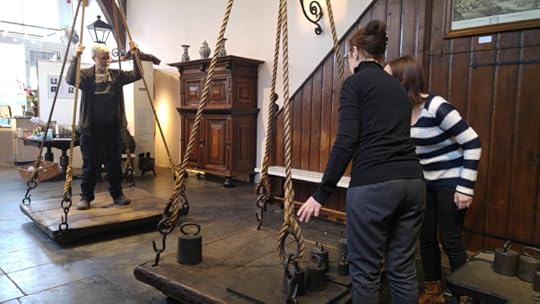 A nervewracking moment as they weigh up my husband to see whether hes a witch
A nervewracking moment as they weigh up my husband to see whether hes a witchBy the time we hit Gouda Cathedral a week later, my husband was cathedralled out. While my daughter and I viewed its famous stained glass, he went off in search of liquid refreshment, returning, jubilant at the appointed time. “I’ve found this amazing Italian bar where everything’s free,” he said. “They’re having some kind of open day. The proprietor told me to bring you.”
No Such Thing as a Free Beer?
The Dutch sign in the window of the Delizie restaurant confirmed that he’d stumbled upon their official opening party. Inside, musical entertainment was provided by an excellent accordionist and a guitarist. We lapped up the congenial atmosphere, as well as the free bar and buffet, and joined in the ribbon-cutting ceremony. We feature in the official photos taken to commemorate the event.
However, I missed one great selfie opportunity of an event, which, for all I know, may currently be the lead story in Gouda’s equivalent of the Tetbury Advertiser: “British tourist’s hair catches fire at Delizie’s launch event”.
Yes, I was that tourist. Leaning back to stretch, I did not notice the lit tealight on the shelf behind me, set at just the right height to ignite my shoulder-length hair.
You know how when the waiter brings in a candle-lit birthday cake for a restaurant guest, everyone turns to look? It was just like that, only with my head substituting for the cake.
Fortunately my husband and I quickly batted out the flames with our hands before any serious harm could be done. Only later did I realise where I’d gone wrong: I’d left my Oudewater certificate back in our camper van.
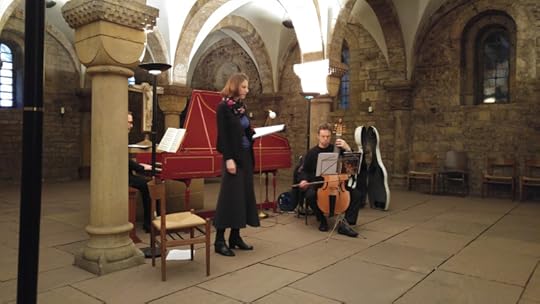 Another unexpected pleasure: discovering a rehearsal of baroque music in the crypt of Bremen Cathedral
Another unexpected pleasure: discovering a rehearsal of baroque music in the crypt of Bremen CathedralMore posts about our latest camper van tour to follow shortly. In the meantime you might enjoy previous posts about:
Our unexpected encounter with a million-pound car in Luxembourg
Our initiation into the secret rites of French male bathing costumes
Available in paperback and ebook
If you enjoy my monthly column in the Tetbury Advertiser, you might like to know that the essays from my first six years writing for them is now available to buy in paperback and as an ebook called Young By Name – available now from all good booksellers.
Filed under: Easter trip 2016, travel, Travels With My Camper Van, writing Tagged: camper van, Delizie, Gouda, Keukenhof, travel

May 4, 2016
To Plot or Not to Plot? – That is the Question
The first in an occasional series of posts about writing for #WritersWednesday
Ask any gathering of authors (would that be a chapter of authors, do you think?) about how they write their books, and one question is guaranteed to pop up in the ensuing conversation: “Are you a plotter or a pantser?”
What on Earth is a Pantser?
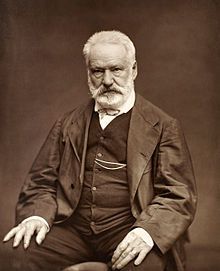
Victor Hugo, clearly having a day off from writing, as he’s fully clothed (photo via Wikipedia, in the public domain)
No, being a pantser doesn’t mean writing in your underwear – though I’m sure some do. Pyjamas are also a must-wear for many writers, myself included. French novelist Victor Hugo apparently wrote wearing nothing at all, so he wouldn’t be tempted to leave the house when he was meant to be writing. As an extra precaution, he also asked his valet to hide his clothes. (Not sure I can class that as a “belt-and-braces” measure.)
What it means is writing “by the seat of your pants”, i.e. literally making it up as you go along, letting instinct and imagination carry you rather than rational planning.
Planning Your Plotting
Which is of course what plotting is all about: planning the structure of your book’s action before you get down to the serious writing. For some authors, sketching out a basic running order and cast of characters counts as plotting. At the other end of the scale lie authors who fill dozens of index cards with scene summaries and spend ages laying them all out on the floor to get them in the right order. Others favour Randy Ingermanson‘s “snowflake” method, where you start with a basic outline then keep adding details like the branches of a snowflake (or, what makes more sense to me, a tree – because stories, unlike snowflakes, aren’t six-pointed and symmetrical).
These days it’s possible to do all your planning on your computer, using software built for authors, such as Scrivener, which includes a virtual corkboard and index cards to aid advance plotting.

The power of Scrivener for authors who like to plan (photo from Scrivener’s website – click image to visit site)
Which Am I?
At risk of sounding indecisive, I think I’m a bit of both – I like to set up chapter headings, whether I’m writing fiction or non-fiction, and to have the basic story outline in my head at least before I kick off. But my favourite part of writing is when the subconscious mind takes over, and all those bits that you’ve been working on without even realising suddenly surface and pour out on to the page, as if you’re taking dictation. In my current work in progress, I was startled when a new character appeared unplanned and started heckling the others. His name’s Billy, and he doesn’t miss a trick. Watch out for him in Best Murder in Show, my current WIP (more writers’ jargon – it means Work in Progress), which I hope to publish later this year.
By the way, in case you’re wondering, I’m typing this fully clothed. Just saying.
Listen to Authors Talking about Plotting and Pantsing
 If you’d like to hear authors talking about the subject in more detail, tune in on YouTube to the panel I chaired on the topic for the Alliance of Independent Authors’ Indie Author Fringe Fair at the time of the London Book Fair 2016. Here’s the link.
If you’d like to hear authors talking about the subject in more detail, tune in on YouTube to the panel I chaired on the topic for the Alliance of Independent Authors’ Indie Author Fringe Fair at the time of the London Book Fair 2016. Here’s the link.
I’m joined by novelists Keith Dixon, Rosalind Minett, and David Penny, and we all had great fun! (Though please excuse my croaky voice – I was just getting over a cold – and the slightly dodgy line that slightly distorted Rosalind’s speech.)
MORE INFORMATION FOR AUTHORS
If you’re an author or an aspiring writer and you’ve not yet come across the Alliance of Independent Authors (ALLi), it’s time you did! I am Commissioning Editor of their Author Advice Centre blog, and there’s a new post just about every day, each from a successful author sharing best practice and top tips. You might also like to find out more about becoming a member of ALLi, which offers many exclusive membership benefits to authors at all stages of their career, from pre-publication to bestseller – click this link for details.
Filed under: writing Tagged: Alliance of Independent Authors, how to write, pantsers, pantsing, plotters, plotting

May 3, 2016
The Green Hills of Home
From the May issue of the Hawkesbury Parish News, a post about coming home from holiday to our Gloucestershire village

The Somerset Monument that towers above my village, Hawkesbury Upton
It’s always good to come back to Hawkesbury after any holiday, no matter how enjoyable. This Easter was no exception.

Somehow wed expected our first sight of the Baltic to be cold, grey and wet
We’d just spent two weeks in our camper van, touring the flatter parts of northern Europe. It was unnerving to know we were often driving below sea level, but the flip side was it made cycling a joy. Taking our bikes off the back of the van to go for a family cycle, we didn’t so much pedal as glide. The level roadways provided the perfect surface for lazy, unmuscled cyclists like me.
While we loved the candy-coloured stripes of the flat Dutch bulb fields and the novelty of exploring new, unknown territory (to us) in northern Germany and Denmark, we missed the gentle undulations of home.
My reasons were not solely aesthetic or sentimental. I had a practical reason to yearn for them. I’d acquired temporary deafness in both ears. What I needed to effect a cure was a good Hawkesbury hill.

Sorry, Denmark, the highest of your hills that we found just wasn’t big enough

Docking at Dover – seeing those White Cliffs always moves me
Townie friends complain that all the roads leading to Hawkesbury are single track. What they don’t mind so much, as they always come by car, is that they are also uphill.
Ideal for guarding against floods, I always think. But there’s a further benefit of all these ups and downs which, unlike flood prevention, never hits news headlines. As our camper van chugged up the homeward hill, the long-awaited miracle happened. My ears popped, and, at last, I could hear. Hurrah for our Hawkesbury home!
I’ll be posting more about our Easter trip shortly – and also about the Hawkesbury Upton Literature Festival, of which I’m founder and director, which took place a fortnight after we got back from holiday. No wonder I’m tired out!
I’m also writing a book about how to travel by camper van on a low budget – sign up here if you’d like to know when it’s available or if you’d like a free review copy prior to publication.
MORE POSTS ABOUT TRIPS IN OUR CAMPER VAN
The Camper Van Salute – a bit like a secret handshake for those who travel in them
The Collective Noun for Camping Cars – as they like to call them on continental Europe
The Unusual Souvenirs of Camper Van Travel – about the bits and pieces that we gather on our travels
Filed under: Easter trip 2016, humour, lifestyle, travel Tagged: camper van, camping car, Cotswolds, deafness, Hawkesbury Upton, hills

April 30, 2016
For the Love of Postcards
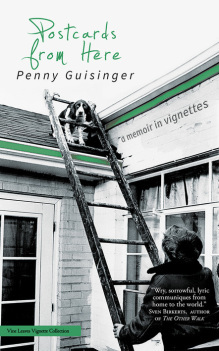 Call me old-fashioned, but I do love a good postcard.
Call me old-fashioned, but I do love a good postcard.
While most of the rest of the world has turned to texting and social media to update their friends when away from home, I still send physical postcards to my family when I’m away on holiday, even though the combined cost of postcard and stamp can be eyewateringly expensive these days. (Denmark, you win the prize for priciest postcard option on our recent family tour of France, Belgium, the Netherlands, Germany and Denmark – but more about that trip later.)
I love receiving postcards too. Yes, that’s a hint, folks. (Honorable mentions for Jess Hiles for sending me a beautifully coloured one of a bunny rabbit, received yesterday, and my Auntie Thelma, who’s always sending lovely museum and art postcards. They don’t have to be from foreign parts!)
Despite the price, postcards have a particular advantage over social media posts: they don’t advertise your absence to the world. I’d love to post photos online as I travel (not least because I know I’ll never get round to uploading all of them on my return), but I can’t help feeling I might as well add a caption saying “Debbie’s not at home right now – burglars welcome!”
Small is Beautiful…
In any case, I have a penchant for small works of art. I love postage stamps too, and pin badges and bookmarks (my favourite travel souvenirs) – so being sent a copy of Penny Guisinger’s Postcards from Here to read and review for Vine Leaves Literary Journal was a real treat. (“Here” happens to be a rural community in Maine, New England, in this case.)
…as in the Vignette
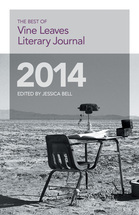
The cover design for the Best of Vine Leaves Literary Journal 2014 also inspired the elegant design of its website
In case you’ve not come across it yet, Vine Leaves Literary Journal celebrates an ancient literary form known as the vignette – so-called because it is a piece of writing short enough to fit on a vine leaf. It’s published from Athens, Greece to a global audience by Australian author/poet/singer/songwriter Jessica Bell and author/screenwriter Dawn Ius. Each issue provides an anthology of the best vignette writing from around the world, gorgeously illustrated with atmospheric photography and artwork.
Vine Leaves also awards annual prizes for single-author vignette collections. As editor of Vine Leaves‘ book review blog (known as Sampling the Wine – what’s not to love about that?!) I have the fun of reviewing them.
Here’s Cheers
To read my reviews of the single-author collections and of other books by contributors to Vine Leaves, hop over to the Sampling the Wine blog – and while you’re there, you might like to take a look around the rest of the site to see if you too can acquire the taste for this ancient but enjoyable form of words.
 FLASH FICTION FOR FREE
FLASH FICTION FOR FREE
You can also sample my own short-form fiction for free if you join my mailing list. , and you’ll be sent a link to download a free copy of my flash fiction collection, Quick Change .
For more thoughts about book reviews, visit my Reading and Reviewing page.
Filed under: reading, writing Tagged: book reviews, Flash Fiction, Penny Guisinger, Postcards from Here, vignette, Vine Leaves Literary Journal

April 15, 2016
A Monumental Error
In the April edition of the Hawkesbury Parish News , I’ve been focusing on a prominent village landmark: the Somerset Monument.
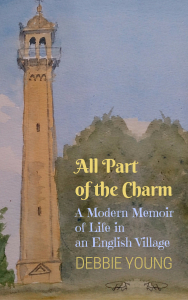
Cover #1 – I loved it, but readers insisted I lose the Italianate column
“But that looks like Italy!” “Definitely Italian.” “No, that doesn’t say English village at all.”
Such was the feedback when I showed foreign friends the proposed cover for All Part of the Charm. This new book brings together all my Parish News columns with my essays about village life.
My friends’ reaction astonished me. Like most people who live here, I’m used to the Monument serving as shorthand for Hawkesbury Upton. Its portrait is everywhere, including the cover of the Parish News. The only challenge is to find an original way to illustrate it. I was using a watercolour painted by my dad.
Then I remembered some basic facts about the Monument’s 170-year history. Its architect was Lewis Vulliamy, who also designed Westonbirt House, now a private school. The Monument echoes the style of the splendid mid-Victorian House. Italian Renaissance was all the rage in those days. Classic Cotswold country cottage it ain’t.
With reluctance I rejected the Monument picture. The new cover design features a more typical Cotswold scene: sheep in rolling fields (also painted by my dad). I just hope nobody thinks the sheep look French.

Now available in paperback – ebook to follow shortly (click on the image to order from Amazon)
Filed under: Hawkesbury Parish News, writing Tagged: All Part of the Charm, classic English images, English village life, Hawkesbury Upton, Somerset Monument

April 14, 2016
Sock Drawer Technology
In the April edition of the Tetbury Advertiser , I’ve been praising local technology experts for their patience with my stone-age husband.

The ulitmate sock drawer organiser? Photo by http://www.aplaceforeverything.co.uk
This month, my technology-averse husband finally agrees to invest in a new PC for his study. Our cottage is not large, but by sacrificing the dining room and third bedroom, we have engineered to each have our own study. This strategy has helped preserve our marriage and my sanity. It spares me from his one-way conversations with his laptop and his pathological untidiness.
His frustration with his computer lies in his inability to master its filing system. He can never find anything he’s looking for. Mind you, the same goes for physical searches around the house. When my daughter can’t find something, my standard response is “Did you do a Daddy look or a Mummy look?”
We blame our caveman ancestors. Men spent their days scanning the horizon for large animals, and women did close work around the cave. Their different perspectives are now hardwired. That may be an urban myth, dreamed up by opticians to spare the pride of men with glasses. Even so, it makes me more tolerant when my husband doesn’t spot what’s right in front of him.
I agree to meet him at the small local computer shop. We favour this shop because its personal service outranks that of superstores. I visit this shop maybe twice a year, yet I’m always served by the same people and greeted by name. And it’s always busy. I don’t know how superstores ever caught on.
My husband has taken his laptop to show what upgrade he needs. When I enter the shop, he and the computer man are poring over its directory screen.
“It’s easy, ” the computer man is explaining. “You just put the documents in the document folder, and the pictures in the picture folder.”
“But what if my documents have pictures in them?” asks my husband.
Diplomatically, the computer man tackles the issue another way.
“Just think of the computer like a wardrobe. You have a drawer for your socks, don’t you? And a drawer for your pants, a place for your shoes. You wouldn’t just throw all your clean clothes into the wardrobe at random, would you?”
He clearly hasn’t seen my husband’s wardrobe.
Should the need arise, the computer man will make a house call to install the new PC. Yet setting it up is easy, once we’ve cleared my husband’s desk to make space for it. He is in the habit of chucking all his post at it – empty envelopes, unwanted circulars, and all – and leaving them to compost down. We profit from our tidying by 55 Euros, fortunately still intact amidst the mess.
I leave him to test his new computer while I empty the washing machine. I’m grateful that we don’t need a house call to install his new computer. But I’m wondering whether the computer man could drop by to help my husband organise his wardrobe.
If you enjoyed this post, originally published in the Tetbury Advertiser , you might like to know you can now buy a collection of my past columns for that esteemed magazine, entitled Young By Name – currently available as a , shortly to be available to order from all good bookstores, and as an ebook.
RELATED POSTS
The Travelling Wardrobe – revealing how many pairs of socks my husband takes on holiday (prepare to be surprised)
Write On – about Plato’s fear of technology
Reverting to Type – about ambitions versus actuality
Filed under: daughter, family, Tetbury Advertiser, writing Tagged: husband, organising your computer files, organising your wardrobe, sock drawer, technology, tidiness, wardrobe

March 17, 2016
Painting the Town Yellow
In this month’s Tetbury Advertiser, I’ve been revisiting one of my favourite topics: eponymous buying, inspired by the purchase of a book that shares it’s name with a local shop.
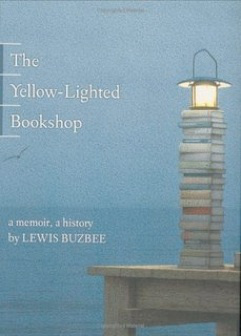 What’s the connection between Tetbury and Vincent van Gogh?
What’s the connection between Tetbury and Vincent van Gogh?
No, it’s not the starry starry nights, the abundance of sunflowers (in the florists’ at least), the wonky-legged chairs in certain cafes, nor even the occasional pipe-smoking man seen wandering through town in a straw hat. It’s one of the shops – The Yellow-Lighted Bookshop, named after Lewis Buzbee’s delightful book, The Yellow-Lighted Bookshop, which weaves together a memoir of his life as a bookseller with the history of books and bookshops.
But what about Van Gogh? I hear you cry.
Bear with me, I’m getting to that…
Buzbee derived his book’s title from a quote from the great Dutch artist, who wrote that he longed to paint “a bookshop with the front yellow and pink in the evening”.
I’m assuming Van Gogh meant as an artist, rather than as a a painter and decorator, although that tack would have earned him more in his lifetime than his canvasses ever did. Whether he ever did it, I’ll never know. But I am very glad his ambition inspired the book’s title, because it panders to my passion for what I call eponymous buying. I’m not sure if that’s a recognised phrase, but it’s the one I use in my head to mean acquiring a product that shares the name of the place you buy it from.
Food and Drink Named After Towns
It’s easy to do with food or drink: Sancerre (the wine) in Sancerre (the French town in which it’s made) or, less romantically, Eccles cakes in Eccles. It’s a shame I don’t like cheese – I’m missing so many easy ticks there – but the roll-call of wines I can handle.

Buying Sancerre in Sancerre a few years ago (hence slightly smug expression). Looks as if we may also have been to a store called Chaussures Rouges.
Eponymous Shops
The names of products and towns are more frequently associated than the names of products and shops. You can’t buy boots in Boots, for example, and White Stuff seems to sell clothes in every colour but white. Anyone trying to buy an apple at Apple would be disappointed.
If I wasn’t such a purist about spelling, I might enjoy buying shoes in Schuh, or, at a push, macs in TK Maxx. I haven’t checked the quality of the drugs in Superdrug, but I’ll take their word for it that they’re super. However, for a lad to go into Ladbrokes and come out as a lad, broke, would be a Pyrrhic
Arguably, some people do leave the fashion chain Fatface with a fat face, but only if they’ve gone in with one in the first place. Whoever thought that was a good fashion chain name needs a firm talking to from Top Shop. And yes, you can buy tops there.
Yellow-Lighted Victory
So I felt I had scored a rare victory when leaving The Yellow Lighted Bookshop recently with The Yellow-Lighted Bookshop under my arm, the name of the book exactly matching the name of the shop in which I’d bought it.
But I failed to find what I really needed to go with it: a good eponymous snack. Anyone care to invent a Tetbury bun? I’m sure there’s a gap in the market.
To find out more about Lewis Buzbee (great name!), click www.lewisbuzbee.com. The book, by the way, is wonderful. Every booklover and every bookseller should read it. I’ll review it on my bookblog soon, and will come back here to link to my review when I’ve written it.
To find out more about the Yellow-Lighted Bookshop – yes, the actual shop – click www.yellow-lightedbookshop.co.uk.
Filed under: Tetbury Advertiser Tagged: eponymous, Lewis Buzbee, reading, Tetbury, Yellow-Lighted Bookshop

March 8, 2016
The Medicine of Music
In the Hawkesbury Parish News this month, I was looking on the bright side of hospital visits.
Although I was not keen on the closure of Frenchay Hospital, every time I go to the revamped Southmead site, I find more to love about it.
When I went to visit a poorly friend today, entering the soaring light-filled atrium immediately made me feel more cheerful as I sought the right “gate” for her ward. Glorious paintings and photographs on the walls, with interesting notes from the artists and photographers, took my mind off medical issues. I felt as if I was about to jet off on holiday, or to enjoy a pleasant day at an art gallery, rather than spend time in hospital.

The most pleasing touch came at the end of my visit. As I was descending the stairs, I became aware of distant piano music, reminding me of posh hotel lounge bars. As if lured by an NHS Pied Piper, I followed the sound down the atrium until I discovered a grand piano, complete with live pianist, and a sign inviting volunteers to play for the benefit of others. It wasn’t just the music that moved me, but the generosity of the musicians who took the time and trouble to perform there for free.

Unexpected medical instrument
For patients and visitors, such acts of kindness are a real tonic. It’s just a shame you can’t get them on prescription.

OTHER POSTS ABOUT HOSPITALS
Visiting the research labs with the JDRF (diabetes charity)
Tour of Hope at Southmead Hospital (report on tour of research labs with JDRF)
Always Someone Worse Off Than Me (funny post about overheard conversation)
Filed under: Hawkesbury Parish News, writing Tagged: art, Frenchay Hospital, health, hospitals, pianos, Southmead Hospital

February 29, 2016
Celebrating Leap Year

The Easter Bunny warming up on 29th February (Image by Morguefile.com)
Compelled to write something to mark Leap Day, I was delighted accept an invitation from my American author friend Samantha Warren‘s Facebook party today, which runs from 10am until 11pm Eastern Standard Time. As that’s five hours behind my local time in England, I have taken advantage of the head start to spend the morning, UK time, writing a short story to join in the fun. If you’re reading this in time to join the party, you’ll find it here on Facebook. Whenever you land on this page, you can just scroll down to read the story for free.
 My story is set in a medieval royal castle, similar to the one featured in my festive short story, The Owl and the Turkey or the Real Reason We Eat Turkey at Christmas. Because I always love an obvious title (I think I must have spent too much timing reading Rudyard Kipling’s Just-So Stories when I was a child), the title for this one is in a similar vein. And like the festive story, of course, it isn’t the real reason at all. I just made it up. I claim the author’s right to poetic licence here – and if you object, you’d better look out, or you might end up in one of my stories…
My story is set in a medieval royal castle, similar to the one featured in my festive short story, The Owl and the Turkey or the Real Reason We Eat Turkey at Christmas. Because I always love an obvious title (I think I must have spent too much timing reading Rudyard Kipling’s Just-So Stories when I was a child), the title for this one is in a similar vein. And like the festive story, of course, it isn’t the real reason at all. I just made it up. I claim the author’s right to poetic licence here – and if you object, you’d better look out, or you might end up in one of my stories…
The Queen and the Astronomer –
or the Real Reason We Celebrate Leap Year Day on 29th February“Your majesty, I fear this early darkness foretells impending doom.”
The king’s spiritual advisor, seated at the far end of the long table, put his hands together as if in prayer.
“What if he is right, sire?” said the young queen, seated in her throne at her new husband’s side. She raised her clear blue eyes from her snow-white embroidery. “It’s never been this cold and dark so early in August before. In our forefathers’ time, this month was always warm and sunny. If you want proof, just look around you at the tapestries.” She waved her free hand at the hangings that added much-needed warmth to the cold stone hall. “Can’t you do something about it? Why not command the sun to stay in the sky a little longer each day?”
The king shook his head and indulged her with a royal smile, touched by her belief in his omnipotence. He did not realise how much her father had exaggerated his power to persuade her to marry him.
“My dear, would it were so simple. I’m afraid the sun falls outside my jurisdiction. I can no more command him to change his hours than I could arrange for the Man in the Moon to visit us. Though, goodness knows, I’ve tried hard enough. I have a dozen archers firing messages skywards every night, but none has reached him yet. Perhaps no-one has yet invented the arrow capable of travelling the necessary ten miles. Every time I behold his gentle smile at night, I must recognise the limits to my powers. Or at least, to the wit of the royal inventors.”
The keeper of the castle, on the left of the table, coughed to signal his intention to speak.
“It the darkness troubles you, sire, I can assure your majesty that we have plenty of candles in our stores. It would be easy for us to provide more light within the castle on these dark days.”
The king hesitated. “Your offer addresses the symptoms. We need to consider the cause.”
The chief royal explorer raised his missing hand. He could not say where he’d lost it – that territory was still uncharted. “Perhaps we might follow the example of the humble swallow, your majesty? Why not travel south when the days start to shorten? I have observed myself that if you travel far enough south, days and nights are of an equal length.”
The king dismissed the speaker with an impatient wave. “Yes, yes, that’s fine if you don’t mind risking falling off the edge of the world.” He banged his fist down on the heavy oak table. “Would you have me sink like a stone, sir? To share the same fate as the hundreds of explorers who never return? Though, heaven knows, I spend enough on their damned ships.”
The elderly court mathematician spotted his chance to add reason to the debate. “Perhaps a giant lever to move the earth a little closer to the sun? With a large enough lever, one may move anything.”
The king looked at him aghast. “Haven’t I already said I don’t trust new-fangled inventions?” He turned to inspect the men ranged down the other side of the table. “What say you, astronomer? The sky is your field of expertise, not the numbers man’s.”
Out of respect for his assembled elders, a pale young man with dark eyes and dense black curls stood up to speak. The young queen tried not to notice how pretty he looked, backlit by the huge log fire blazing in the fireplace.
“Your majesty, I have just completed some fascinating observations of the heavenly bodies. My findings convince me that our calendar is at odds with the natural order of the skies. Each year we mark 365 days, but to keep our seasons consistent requires an extra quarter day each year. The simple solution is to add one.”
He sat down.
“Simple? I’d not call that solution simple,” retorted the mathematican, his lank white locks shaking. “How on earth could we add a quarter of a day? Should we sleep through it, and treat it as an extra night? Or do a quarter as much of each of our normal day’s tasks? Either way, it would never catch on. The peasants would revolt. They lack our intellectual understanding of such matters.”
The astronomer rose to his feet again and gave a slight bow to the king. “I’m sorry, I should explain my proposition in more detail. I suggest we add a whole day once every four years, perhaps at the end of February to even things up.”
“Ugh, February, my least favourite month,” declared the Queen. She pulled hard on her embroidery needle. “Why not repeat one of our better days instead? Two Christmas Days, perhaps?”
The king reached over the thick arm of his throne to pat her on the head.
“Ah, my dear, how little you understand of scientific matters. Only the wit of men can resolve such a tricky problem. We can’t have two Christmas days, because Jesus wasn’t twins.”
Unsure of whether he’d just made a sound point or a joke, the king glanced around the table for reassurance. He hoped the reaction of his advisors would enlighten him. After all, that was why he paid them.
The advisors smiled and nodded, a shrewd way of covering both possibilities. Those that did not practise such diplomacy did not last long in this king’s court.
“Then I propose we celebrate your birthday two days in a row, sire,” the queen suggested. She flashed a sweet smile, her head on one side. Though they’d married only a month before, she was already a skilled manipulator of the royal ego.
“Ah, but then your queen would age twice as fast.” The mathematician addressed only the king. The new queen had yet to win him over, having had no cause to do so yet.
“No, no, no,” said the king. “We can’t have that.” He turned to his wife. “But you, my dear, may have the honour if you wish? Two birthdays for you on consecutive days? There’d be more presents.”
He was not the only one who had the measure of his spouse.
The queen’s smile tightened as she considered the prospect.
The mathematician butted in again. “Sire, that’s the perfect solution. And there’s an added bonus. Within just twenty years, your wife would be your own age.”
“And in forty years, I’d be twenty years older than him,” said the queen. She patted her husband’s hand. “I don’t think you would like that, would you my dear?”
The advisors stared down at the table, embarrassed. Did she not know that none of her predecessors had survived even five years of marriage?
“Perhaps we could mark it as a special feast day,” she continued, oblivious. “Being so rare, it would be worth celebrating.” She was still young enough for four years to seem a long time, in relation to her own age. “Especially when February is always so gloomy.”
The keeper of the royal purse leaned forward, eager to speak. He was already fond of the spirited young queen. She’d made winning his favour a priority, ensuring her own purse was always full. But, so far, for him at least, duty came first.
“I would prefer the extra day to fall on a week day. That way we’d gain a day’s labour from every peasant, and an extra day in which to impose tax.”
The king’s face brightened. “That is a splendid idea. Astronomer, is there a propitious time of year at which we should set this extra day?”
The astronomer stood up again, always conscious of his inferior years in this company. “As I suggested earlier, we should add it to the end of little February, which so lacks days at present.”
“That would tidy things up,” agreed the keeper of the royal purse. “While we’re at it, could we make it two days, for the sake of neatness? And round the other months down to a mere thirty? It would make my job so much easier.”
Everyone ignored the indignant huff that came from the direction of the mathematician.
“I’m afraid not, sire, much as I’d love to help you. That approach would do more harm than good. But fear not – after a few of the longer years have passed, everyone will become used to the new order of things. No-one will even think to remark upon a twenty-nine day February. Unless of course they have the misfortune to be born on one.”
A ripple of laughter passed around the table, stopping only when it reached the queen. She shot an anxious glance at the astronomer. As their gaze locked, she put a hand to her still flat stomach. Only they realised the significance of the gesture.
His face warmed, thinking back to their secret trysts in the weeks before the royal wedding. He had comforted her the best way he knew, on dark nights beneath starry skies. He had felt so sorry for her having to marry against her will, and she was so beautiful and coquettish.
Maybe his stargazing had made him too romantic, but he was surprised how soon she cast him aside. A week before the wedding, she told him she wished she had never set eyes on his accursed telescope.
He ran one hand around his young, unlined and still intact neck. He wondered whether he would live to see their ill-starred child born on the first ever 29th February.
~~~~~~~~~~~~
 If you enjoyed this story, you might also like to read The Owl and the Turkey or the Real Reason We Eat Turkey at Christmas, which is available as a stand-alone single story ebook on all the usual platforms. (Here it is on Amazon.) I’m now wondering whether I should write more stories like this to create a collection. What do you think of that idea?
If you enjoyed this story, you might also like to read The Owl and the Turkey or the Real Reason We Eat Turkey at Christmas, which is available as a stand-alone single story ebook on all the usual platforms. (Here it is on Amazon.) I’m now wondering whether I should write more stories like this to create a collection. What do you think of that idea?
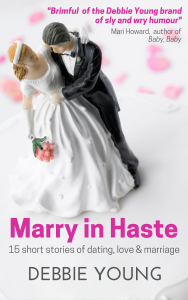
Now available in paperback and ebook
More topically for the 29th February, a day on which in many countries it’s traditional for unmarried women to propose to men, you may like to try Marry in Haste, my latest collection of humorous short stories, launched last month, and fast accruing excellent reviews. The ebook is currently available exclusively from Amazon here, and you can order the paperback from any stockist, online and in the real world, by quoting ISBN 978-1911223016.
If you enjoy any of my stories, please consider leaving a review on Amazon, Goodreads, or any other site of your choice. Or just recommend it to your friends! All these things help authors gain more readers. Thank you.
Filed under: short stories, writing Tagged: February 29th, leap day, Leap year, why do we have a leap year

February 16, 2016
History is Relative
My February column in the Tetbury Advertiser reflects on my father’s role in historic events and looks forward to a talk I’ll be giving next month to the History of Tetbury Society
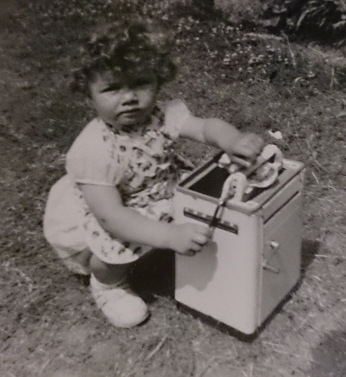
Before I was old enough to start mangling words, I love the mangle on my toy washing machine
While in my head I still feel about 12, there’s considerable evidence to the contrary, January marked my twenty-fifth anniversary of living in the Cotswolds, and then came my birthday, which occasioned a nostalgic flick through old albums of me as a child at my parents’ house.
These are proper, old-fashioned albums, filled with photos taken with cameras using rolls of film. The 12, 24 or 36 prints per film were developed and printed by the local pharmacist. The cost was so high that we took pictures sparingly, often finishing a film only just in time to beat its expiry date.
For most of the photos of myself as a child, I can remember details of the moment each one was captured, including the colour and texture of the clothes I was wearing, even though the pictures are black and white. What startles me, though, is the realisation that many items in the photos look as if they belong in a museum: my old-fashioned tricycle, my doll’s pushchair (pushchairs, not buggies, in those days), and my toy washing machine, complete with – wait for it – a mangle.
A Voyage with my Father (in Dry Dock)
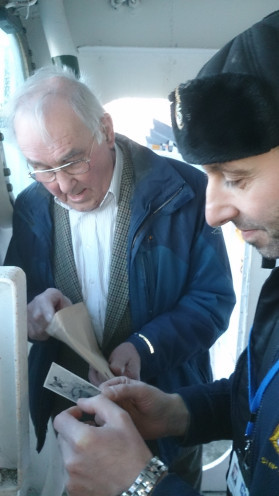
My dad impresses our tour guide on the HMS Belfast with photos of his seafaring days
But before I can feel too ancient, my sense of perspective is restored by a trip to the HMS Belfast, now permanently docked in London and run by the Imperial War Museum. Practically my entire family accompany my father (83), who served on the Belfast during the Korean War. He joined its crew at the age of 18, just five years after the end of the Second World War. The museum’s exhibits remind us just how different daily life was then.
As we pass the ship’s NAAFI shop, my father fondly remembers buying sweets, still on ration ashore, to take home to his younger sister. The story captures the imagination of my six-year-old cousin William. “Uncle Peter, could you buy anything in the NAAFI shop?” he enquires. “Oh yes,” says my father, whose needs at sea were few. “Could you buy pizza?” is my cousin’s earnest reply. It’s a striking example of the change in our society’s eating habits in the intervening 66 years.
Museums like these and individuals like my father who carefully preserve photo albums, diaries and letters remind us in our busy, time-pressed world that what happens today is tomorrow’s history. Long may they encourage us to follow in their footsteps.
I’m very much looking forward to visiting the History of Tetbury Society on Thursday 3rd March in Christchurch, The Chipping, to offer advice on recording your memories for the benefit of future generations. I’ll bring with me some inspiring case studies. By the way, proof of age is not required for admission!
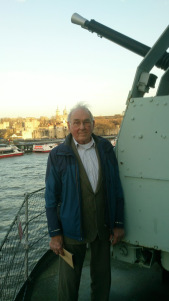
Once a sailor… (In the background, the Tower of London)
POSTSCRIPT
I would like to express huge thanks to the staff of the HMS Belfast who surprised my dad with a guided VIP tour on arrival. I’d phoned in advance to advise them that we were bringing a veteran member of the crew, and as our party boarded the ship, their senior tour guide, Rodrigo, approached us with the words “Is there anyone here who has served on this ship?” It was a priceless moment, and so began a really special tour, taking us to parts of the ship not normally open to the public, including the Admiral’s quarters.
For more information about the HMS Belfast, click here to visit its website.
Filed under: family, father, nostalgia, Tetbury Advertiser Tagged: History of Tetbury Society, HMS Belfast, memories, nostalgia, old photos





